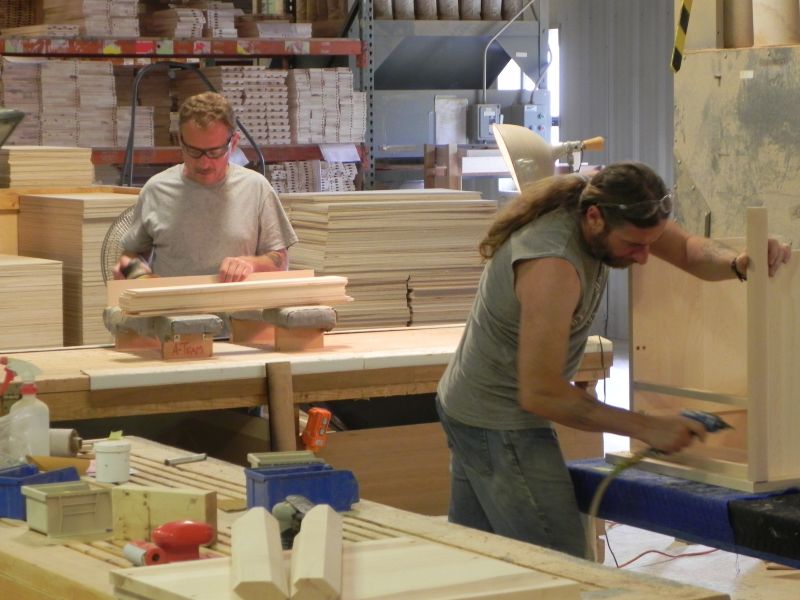20% tariffs on Vietnam could create some additional demand for US-made furniture
HIGH POINT — Domestic case goods manufacturers are optimistic that a spike in interest driven by tariffs this past spring will continue to fuel business in the weeks and months ahead.
This is particularly the case now that tariffs have been set at 20% against Vietnam, the largest foreign producer of wooden bedroom and also a significant resource for wood dining furniture.
While the jury is still out on how much the 20% tariff will spur orders moving forward, several companies have told Home News Now that they have seen a bump in both traffic and even orders later in the second quarter, a trend many hope will continue throughout the second half.
This started with a significant uptick in traffic for some at the April High Point Market, where some retailers were seeking alternatives to imports.
Doug Bassett, president of case goods manufacturer Vaughan-Bassett Furniture, said the company had a 50% increase in traffic in April compared with the October market. Some of those were new accounts that the company has converted into customers, although Bassett and others have not described business as booming given the still-slow retail environment.

“We had a really good market even when it was only 10%, and who knew where the thing was going,” Bassett told Home News Now, noting that business in May, June and the first part of July was much stronger than the first several months of the year. “The tariff got them in (the showroom) but the product helped get them across the finish line.”
At that point, he noted, the company was seeing a benefit from the 10% tariff, roughly half of which was being absorbed by suppliers with the balance being passed on to customers.
“So this next 10%, the majority of it will be passed on to the dealer or the importer of record, or through price increases one way or another,” he added. “When you combine that with increases in container and freight costs, furniture from Vietnam is going to go up in price quite a bit. So we are going to benefit from that.”
Bassett noted that the early uptick in July translated into an overall 10% increase in written business for the rest of the month compared with July 2024.
“We have seen a bump in business that we don’t think is out there for the real world,” he said, adding, “We attributed it in part to the tariff situation and the fact that domestic product doesn’t have all the risks or costs associated with imports. We also had a very strong product market in April and over half the surge in business has been for new product. Looking at where the uptick is, our new introduction is leading the way. We are excited our business has been good so far this summer. We assume we are picking up some market share.”
Case goods manufacturer Mavin also saw steady traffic at the spring market. Business also has been strong so far this year.
“It was interesting because our overall traffic was very even with the past couple of markets both in the fall and the previous spring,” said David Wallace, sales manager of Mavin’s furniture division. “Some of our dealer base actually stayed home from spring market … but that was replaced by a higher percentage of prospective new customers that came in to have a look. I would even dare say that some were even probing a bit trying to get an early read on potential options depending on which way the tariff goes. There were some fairly large retailers that we had not discussed coming to see us that came in and they don’t usually do that.”

Tariffs aside, he believes the company also has a strong product mix, led largely by custom dining, then followed by bedroom, plus newer categories such as occasional and home office, which were launched in 2023 and last year respectively.
Year-to-date through most of July, business has been up double digits, he said, noting that the company not only received a boost from Memorial Day sales activity, but that sales in June and July — typically slower months — also were strong.
“It didn’t slow down for us,” Wallace said. “June was a record month and for the Fourth of July people apparently had a lot of promotions that were successful. … We have stayed on track year-to-date, and I thought “surely by the end of July this would abate, and we would see a dip and catch our collective breath. But it still hasn’t happened.”
While he believes the expanded product mix is helping drive interest and sales, he noted that the tariffs are also creating opportunities for domestic producers such as Mavin.
“I think it is all of it,” he said of dealer interest in the expanded mix, adding, “But probably the biggest drive is the uncertainty around imports. It would have to be that, I would think.”
This, he said, ultimately is causing dealers to lean back on imports and seek domestic resources such as Mavin to carry more domestic product.
Domestic case goods producer Gat Creek also saw an increase in interest in its new and existing product mix at the April market, both in inquiries and dealers adding new items to their floor.
“If you look at year over year, we have seen some uptick in business, but we are into the summer which is the slowest time of the year,” said CEO Gat Caperton, noting that this has occurred without a big increase in product being added to the mix. “Our end of the market is better than average, and we have been a little better than average. To have an uptick with not a whole lot of new product out there is pretty good and a pretty positive thing to report these days.”

He attributed the interest and uptick to tariffs and the uncertainty they have caused in the marketplace, thus causing customers to consider revisiting their supply chain. That said, he noted, it can take some time for businesses to change their business models, although that could be hastened with tariffs finally being set at 20%.
And sources note that it is not just Vietnam, but the establishment of tariffs on other source countries, from Indonesia at 19% to India at 25%, that likely will continue to cause some further shift toward domestic wood furniture.
Kevin Kauffman, founder and president of case goods manufacturer Simply Amish, said that business has remained a little soft, but is overall about even with last year.
“I think the uncertainty around tariffs from any country has created a little more demand for U.S.-made product, not in a huge way, but I have had several retailers say we are boosting our American-made line or are adding some more American-made products,” he said.
Today, he expects that interest and demand will continue even further now that tariffs are established for most furniture-producing countries. It’s a situation he believes could boost business in the second half, as more retailers plan to reduce their exposure to some imports.
“We are probably not anywhere close to competing with Vietnam even with tariffs, but it would be a lot closer with a 20% increase obviously,” he said, noting, “The whole tariff thing has definitely created more demand for U.S.-made in my opinion.”
In addition to bedroom, its top-selling category, the demand could boost business in the dining category as well as smaller categories such as occasional and home office.
Ben Copeland, director of sales and marketing at wood furniture manufacturer Copeland Furniture, said that business has picked up since Memorial Day, leading to a stronger than normal summer season.

“Whether we can attribute that to tariffs or not, we don’t know that for certain,” he told Home News Now, noting that while this is mostly business with existing accounts, Copeland has also been receiving some inquiries from some larger retailers, some of which are new to the company. “We are currently level with last year and ’24 was about level with ’23. If I am to drill down a little bit, the first four months of this year was soft and as I mentioned, it’s come back much stronger since Memorial Day.”
He attributed the initial softness earlier in the year to low consumer sentiment combined with interest rate levels that have impacted new and existing home sales. Tariffs also likely had an impact, but he said that since Memorial Day, the rebound indicates things are starting to change.
“I think there was a lot of initial apprehension about what tariffs were going to do to the world and the economy,” he added. “It may be that markets, retailers and consumers have maybe come to terms with some of that a little bit and are getting on with their lives and their businesses and their purchases. That may be some of what we are seeing.”
The question moving forward will be to what extent manufacturers may need to increase capacity or hiring to meet some of the demand.
Thus far, the needle has moved some but not enough for any major changes, manufacturers have said.
“We are getting a really nice number every week in terms of new placements and if you put that together, our business is better right now in May and June and heading into July than it was January through April,” said Bassett of Vaughan-Bassett. “We are seeing an uptick, but business conditions are still extremely tough.”
Thus, with any further increase in business, he said, that the company would likely add hours first then add workers as demand warranted.
“We would add them if we need them and when we are maxing out the people we have, but I think that is where things are moving,” he said.
Mavin, which currently employs 261 people in production, is looking to increase its headcount in the plant by roughly 5% sometime in the near future.
“We haven’t been in a situation where we thought we had too many people working in our factory in quite a long time,” said Wallace, noting that while he thinks the hiring will come sooner versus later, it’s “with the caveat that we would not hire for the sake of hiring. We are always looking for the right caliber worker and the right quality worker. We operate to very high standards and we have a very positive and strong culture, so we are looking for people that would really like to come and stay for a while, not just get a paycheck. I know everybody is looking for that, but we are not in a place where we have to make hires. We want to.”




